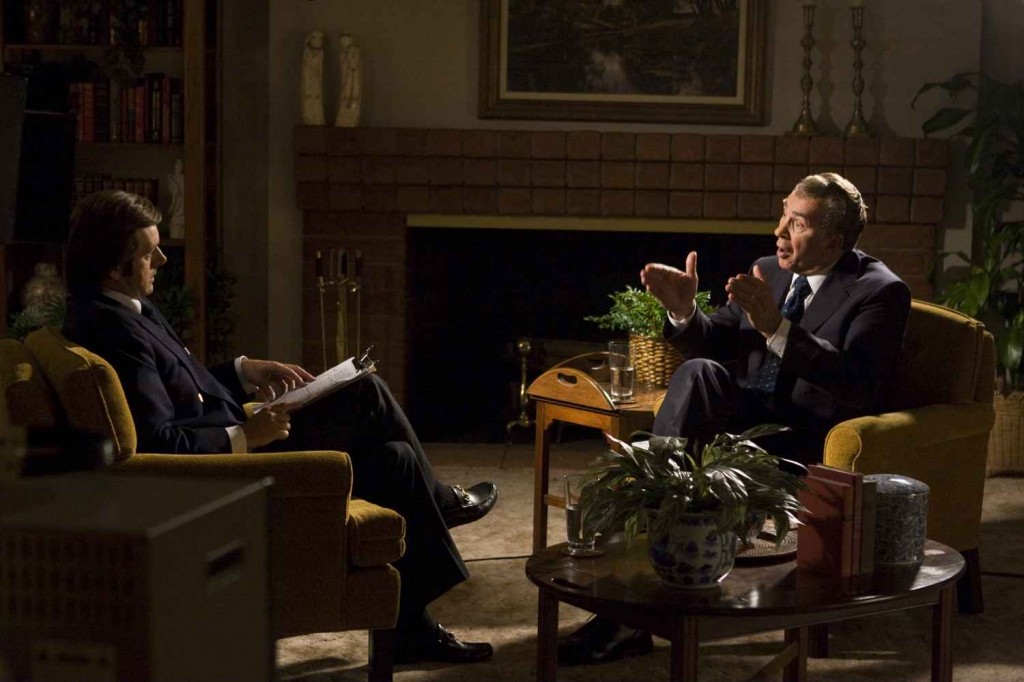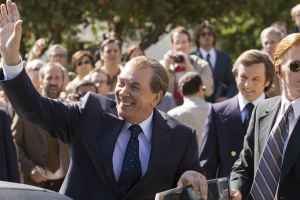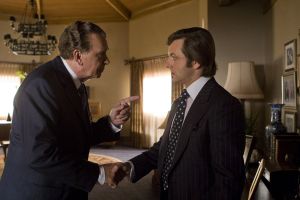
Last week, on the day it was chosen Best Picture by the National Board of Review, I went to a screening of Slumdog Millionaire (about a slum kid who goes on the Indian version of Who Wants to be a Millionaire?) and Q & A afterwards with director Danny Boyle, cinematographer Anthony Dod Mantle, editor Chris Dickens, and composer A.R. Rahman. The movie has been in theaters for a few weeks (I held out for the free screening ’cause I’m cheap) so I won’t review it but will say you should see it if you haven’t already. Considering the recent terrorist attacks there, the movie is a life-affirming tribute to the hope and resilience pulsing through Mumbai. Some of the other Golden Globes Best Picture contenders can be more cerebral than warm but Slumdog is all heart.
The Q & A, moderated by director Taylor Hackford, offered interesting insight about the process of making this film. The following is not verbatim but I took notes like mad and here are the highlights.
***************************
Hackford (Ray, An Officer and a Gentleman) introduced Boyle, Mantle, Dickens and Rahman to a standing ovation. I’ve been to a lot of screenings and this kind of reaction is rare, especially when there’s no big star on stage. It’s a testament to these men’s achievements in the movie.
Once everyone was seated, Hackford started by saying he first met Boyle in Helsinki when Boyle was shooting his first feature, Shallow Grave (a terrific little thriller; Netflix it). Then he asked Boyle, “You’d never been to India before doing this movie?”
“No. My dad served in the war, he was in Bombay. The British ruled [India] until ’47. In Britain in the ’60s and ’70s, there was a lot of racist humor on TV and my dad would say, ‘That’s not right.’ ” Boyle encouraged people to visit India because “it’s one of the most transformational experiences you’ll have if you go.”
Hackford asked, “Your perception of Bombay is extraordinary. To cast three actors for each lead role? How’d you go about that?”
“I hate in American television when a 29-year-old is cast to play a 17-year-old and then grows older to be 29. [In the script], the first stage was 10, then 16 then 25. When we got there, we felt they should be younger. [But] the 7-year-olds didn’t speak English. Our casting director suggested we change it to Hindi because it’s more authentic. Then we told Warner Bros. a third of the movie would be in Hindi and they were absolutely thrilled!” Boyle said jokingly. He said in fact there was a long moment of dead silence on the other end of the call.
“Each actor is so distinct, it’s extraordinary. They all had big ears; it’s fantastic casting. The game show host is oily, just perfect…It’s a very Dickensian story,” Hackford said.
“It’s based on a novel by an Indian diplomat [Vikas Swarup]. It’s called Q & A and it’s about a slum kid going on the richest game show. Simon [Beaufoy] adapted it very freely and created a love story to be the backstory. What he did with the love story was to stop the game show from being the spine for the film. The kid hijacks the show for his own ends. The company that invented the game show, [owned by] Paul Smith, sold the rights to it years ago but he kept a clause saying that he’d have the right to make any movie about the show for free. And we got that.” [Smith executive-produced the film.]
“Let’s talk to the other collaborators,” Hackford said, then addressed Mantle, the cinematographer. “Was this shot on film or digital? How did you keep people in the streets from waving at the camera?”
“If there were people behind our backs saying they’d be reprimanded if they did that, I don’t know,” Mantle replied. “I’m used to a calm, boring space to work in; this was totally opposite. Everything’s massive. We tried to be as discreet as possible. You can’t use a Steadycam, it’s too crowded to chase the kids [through the streets].” Mantle then talked about how new, small digital cameras had to be packed in dry ice (to prevent overheating) and camouflaged on his body, making him look like “a cross between Darth Vader and Buzz Lightyear.”
“You had fantastic close-ups and framing,” Hackford said. “They really help tell that story.”
“There’s a huge close-up in the beginning where Jamal’s being tortured,” Boyle said. “I was trying to hurtle people into the movie, make it subjective. You either leave with a migraine or you’re on board.”
Hackford asked about the transitions, “how to finesse the present and the past, with the flash forwards and flashbacks. Let’s go to Chris [the editor]. You’ve never worked with Danny Boyle before?”
“No, it’s my first time,” Dickens said. “This was a challenging film and that’s why I wanted to do it…A lot of flashbacks were written in the script. The love story was the spine, you keep going back to it so you know where you are…I also used the [game show’s] theme music; it’s very recognizable so you know where you are. Another mechanic is memory. It doesn’t work in neat blocks; it’s kinda jumbled up. It gives me freedom to go anywhere.”
Boyle interjected, “It’s basically a series of flashbacks, but you’d be exhausted if we used basic flashbacks…There are three sets of actors so you clearly know where you are. Usually these films have old people dying and it’s very moving but this kid is eighteen, he has the most beautiful girl and twenty million rupees. What could be better?”
“We took one question out because it wasn’t right. There are only twelve questions or something [on the show],” Dickens said.
“The question will be on the DVD,” Boyle said.
Hackford then addressed Rahman, the composer. “Did [Boyle] give you a rough copy of the film?”
“He gave me a script, which I never read,” Rahman said, to audience laughter. “He finally gave me a DVD. I thought it was fantastic, there’s so much hope in it. I started giving him ideas and he responded to it.”
Hackford commented that there’s fabulous use of sound in the movie then turned back to Boyle. “Did you cast the kids from the slums?”

“Two of them, the youngest ones. We put them in school,” Boyle said, to audience applause. “The girl is very bright, the boy is not quite as academic but he’s very good with crayons and coloring in.” Boyle went on to explain that money was put in a trust fund for them until they’re sixteen. “The children didn’t know how old they were because they didn’t know their own birth dates.” They were given dates and introduced to the tradition of celebrating birthdays and receiving gifts.”Now they love birthdays,” Boyle said.
Hackford asked how long the shoot was.
“We were there November, December, part of January,” Boyle answered.
Mantle said he had five cameras but not five operators, which was a problem. “A grandchild of Gandhi did second unit stuff for us and he was tremendous.”
Hackford asked. “Why did Warner Bros. step away from this?”
Boyle explained that he’d received sixty percent of his financing through Pathe’ in Europe and forty percent through Warner Bros. but “they had closed Warner Independent. So we showed it to Peter Rice at Fox, who thought it was wonderful.”
Hackford asked Boyle if, once he got to Mumbai, he ever thought he was crazy to try and make this movie there.
“Mumbai, like New York, grabs you by the throat and says, ‘You’ll never be the same again.’ There’s such energy, lots of poverty but none of it is abject. Everybody is trying to move forward towards happiness. I can’t believe I was allowed to make a movie in such a city, a third of it in Hindi.”
“A.R. Rahman has sold two hundred million cassettes [of music]. How did you end up working with him?” Hackford asked.
“It’s difficult to explain how famous A.R. is in India. We’d go to lunch and people would just point at him. [In Rahman’s score for the movie], you can feel the fusion of different styles—classical, hip hop, R & B, disco, classic Bollywood music. I promised him I’d mix it very loud because sometimes the score is very quiet and can’t be heard.”
At this point, Hackford opened up the questions to people in the audience. Someone asked, “How did you get the children to have such relationships, with them being untrained?”
“The middle child who played Jamal is incredible,” Boyle said. “He’d done a couple films before, he knew his marks. I had a lovely casting director, Loveleen Tandan, who worked with me all the time with them. I didn’t understand what they were able to grasp sometimes but [that boy] could grasp betrayal.”
“They seemed to have more life experience, been through more, but they were also green,” Dickens added. “They got better as they went along. In the beginning, they’d be giggling, not knowing cameras were rolling.”
An audience member asked, “How many of you got sick?”
“I lost eleven kilos [about 24 lbs.] but from running. I was never sick,” Boyle said.
Dickens said, “I gained weight. The food was so good and I was sitting down a lot.”
Someone asked what the film’s budget was.
“We raised eight million in Europe and five million from Warner Bros., though the producer said it cost fourteen million so I wonder what happened to that extra million.”
Another audience member asked Boyle to talk about how he’s always pushing the envelope in his filmmaking.
“I like taking risks,” Boyle answered. “If you get a chance, take a risk. You deserve it. Sometimes it doesn’t work but you should try.” He then recommended the Swedish film, Let the Right One In, saying it’s “very risk-taking.”
Someone mentioned that an M.I.A. song from the movie was nominated for the Record of the Year Grammy and Boyle said M.I.A. “had grown up worshipping A.R.’s music.”
Rahman said, “Danny wanted me to co-write a song…”
“The kids running through the slums in the beginning, that track of the movie,” Boyle interjected.
Rahman then said the collaboration involved him sending the temp to M.I.A. in New York and her sending it back to him via the Internet.
An audience member commented on how the two brothers in the movie went down such different paths in life and asked, “Do you think it’s hereditary or experience?” [SPOILER AHEAD–skip to next paragraph if you don’t want to know]
“One of the things we changed was the brother committing suicide in the end,” Boyle said. “All the Bollywood actors said he’d never do that; he’d shoot the boss. The two brothers thing—that’s classic Bollywood: good brother, bad brother. The death of the mom marked them. Salim would use violence against other people so it could never be used on him again. Jamal had the grace to overcome that.”

Next, a man in the audience said he was surprised Boyle had never been in Mumbai since kinetic pacing is a signature of his films. “Did you have a pre-conceived notion of pace?”
“The feeling of that is in the script. When you get to the city, you can’t avoid it. The thing I loved was, the slums are not what you’d think. There’s cottage industry, enterprise—people don’t want to be portrayed as poor. I said, ‘But it has to be authentic,’ and they said, ‘Then don’t be pitiful about it.’ Westerners, we are so sleepy compared to them. There’s so much energy.”
Hackford concluded the evening by saying, “This film is an indie, there are no stars, but it reaches out and grabs you with its spirit. It communicates life because of the filmmakers, led by Danny Boyle. Let’s congratulate them.”
 Best Actor: Sean Penn for Milk. This is Penn as we’ve rarely seen him—smiling, vulnerable, in love, inspiring—instead of angry, grim or high. He brings Harvey Milk vividly to life and makes us feel the loss of the real man all over again.
Best Actor: Sean Penn for Milk. This is Penn as we’ve rarely seen him—smiling, vulnerable, in love, inspiring—instead of angry, grim or high. He brings Harvey Milk vividly to life and makes us feel the loss of the real man all over again. Best Actress: Kate Winslet for Revolutionary Road. I’ve liked some of her other performances better—Clementine in Eternal Sunshine of a Spotless Mind, Sarah in Little Children—but this year has been light on female contenders so I think Winslet will finally get her little golden man for this harrowing performance.
Best Actress: Kate Winslet for Revolutionary Road. I’ve liked some of her other performances better—Clementine in Eternal Sunshine of a Spotless Mind, Sarah in Little Children—but this year has been light on female contenders so I think Winslet will finally get her little golden man for this harrowing performance. Best Supporting Actor: Josh Brolin for Milk. The film’s cast is very, very strong but, besides Penn’s, Brolin’s performance as Dan White is the one that stayed with me long after I saw the movie. It’s a beautifully nuanced portrayal of a man in conflict with himself and the changing world around him.
Best Supporting Actor: Josh Brolin for Milk. The film’s cast is very, very strong but, besides Penn’s, Brolin’s performance as Dan White is the one that stayed with me long after I saw the movie. It’s a beautifully nuanced portrayal of a man in conflict with himself and the changing world around him. Best Supporting Actress – Penelope Cruz for Vicky Christina Barcelona. She is on fire in this film. She’s passionate, electric, crazy, and just uninhibited. When she’s on screen, you can’t watch anyone else. Considering the other actors include Javier Bardem and Scarlett Johansson, that’s saying a lot.
Best Supporting Actress – Penelope Cruz for Vicky Christina Barcelona. She is on fire in this film. She’s passionate, electric, crazy, and just uninhibited. When she’s on screen, you can’t watch anyone else. Considering the other actors include Javier Bardem and Scarlett Johansson, that’s saying a lot. At least Raiders and Babe were nominated for Best Picture. My favorite film this year, with probably no chances for any Oscar nominations (though I was thrilled it received 3 major Golden Globes noms), is In Bruges, a film starring Colin Farrell, Brendan Gleeson and Ralph Fiennes that I saw back in January and has long been out on DVD. This movie is well-acted, brilliantly written, suspenseful, hilarious, twisted and most important (to me), it was damn entertaining.
At least Raiders and Babe were nominated for Best Picture. My favorite film this year, with probably no chances for any Oscar nominations (though I was thrilled it received 3 major Golden Globes noms), is In Bruges, a film starring Colin Farrell, Brendan Gleeson and Ralph Fiennes that I saw back in January and has long been out on DVD. This movie is well-acted, brilliantly written, suspenseful, hilarious, twisted and most important (to me), it was damn entertaining.

 Bryan Singer’s latest directorial effort is based on the true story of the 15th and final attempt by Adolf Hitler’s regime to assassinate him. Since most of us know how Hitler died, it’s not a spoiler to tell you that this attempt failed. With this in mind, it is surprising how much the script ratchets up the tension throughout the film to keep us on the edge of our seats while we watch the inevitable play out in front of us.
Bryan Singer’s latest directorial effort is based on the true story of the 15th and final attempt by Adolf Hitler’s regime to assassinate him. Since most of us know how Hitler died, it’s not a spoiler to tell you that this attempt failed. With this in mind, it is surprising how much the script ratchets up the tension throughout the film to keep us on the edge of our seats while we watch the inevitable play out in front of us. British actor who portrayed Hitler with a focused, intimidating stillness and perfect German intonations—speak with an English accent? It’s also hard to believe that the other very talented British actors—Tom Wilkinson, Bill Nighy, Terrence Stamp, Eddie Izzard, Kenneth Branagh, Bernard Hill—wouldn’t have been capable of pulling off a convincing German accent.
British actor who portrayed Hitler with a focused, intimidating stillness and perfect German intonations—speak with an English accent? It’s also hard to believe that the other very talented British actors—Tom Wilkinson, Bill Nighy, Terrence Stamp, Eddie Izzard, Kenneth Branagh, Bernard Hill—wouldn’t have been capable of pulling off a convincing German accent.




